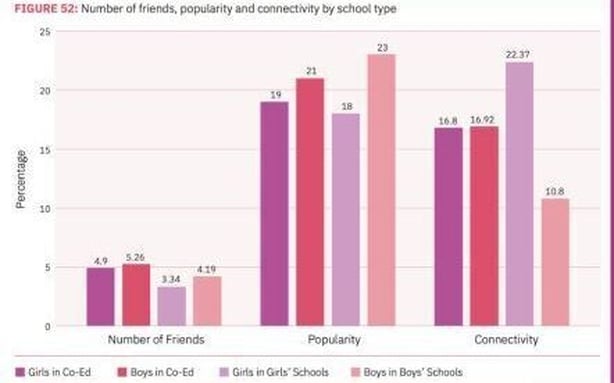Children who attend co-educational schools have more friends, a study which focuses on gender and schooling here has found.
The UCD School of Education report found that girls who attend all-girls' primary schools have significantly fewer friends than children, whether boys or girls, who attend other schools and that both boys and girls in co-educational schools have more friends than boys and girls in single-sex schools.
The information is contained in the latest report from the 'Children's School Lives' longitudinal study which has been following and examining the experiences of children in 189 primary schools nationally through questionnaires, observation, and case studies.
The study also found that friendships between girls are closer, while boys are more likely to emphasise popularity in their social networks.
It found that these patterns are strongest in single-sex schools.
The study found a range of differences "both within and between" girls and boys when it comes to their levels of confidence and self-esteem, their aspirations, as well as their attitudes towards learning and other areas of school life.

It says these all "impact on how children engage with their learning in primary school and the possibilities they see for themselves".
The study also identified differences in the views of children attending single-sex or co-educational schools.
Girls in all-girls’ schools are the most likely to say that their teacher thinks they are "smart", but they are also most likely to say that they do not have a voice in school, the study found.
Girls in all-girls’ schools had the most gender-equal views, while boys in all-boys’ schools had the least gender-equal views.
Meanwhile, teachers in both single-sex and co-educational schools expressed a preference for co-educational schools as more representative of society and everyday life.
"Single-sex schools are perceived by most teachers interviewed to reinforce gender binaries", the study states.
Children who participated in interviews with the researchers were found to "clearly differentiate" between the attributes and behaviours of boys and girls.
"Girls are typically identified by all children as being more engaged with learning, less disruptive in class and more gentle in play activities than are boys," the study noted.
Researchers found that children associated being a "good" boy with intelligence, ability in maths and being physically strong with an expectation to be good at sport.
By contrast, a "good" girl was associated with "niceness, kindness, caring and politeness".
The study found that as children get older there is evidence of less gender stereotyping among girls, but more gender stereotyping among boys.
When it comes to liking school, the study found that girls consistently reflect more positive attitudes toward school than boys and that this is the case for children attending both single-sex and co-educational schools.
Differences are also evident between boys and girls with respect to how they engage with subjects, the study found.
Girls are more likely than boys to be interested in reading and writing and boys are more likely than girls to report feeling "bored, worried or confused by literacy learning activities".
When it comes to maths researchers found a significant difference between how boys and girls rate themselves, with boys rating their abilities higher compared to how girls rate their abilities.
Across other areas of the curriculum as well as with extra-curricular activities the study has identified distinct differences.
"Boys demonstrated higher interest in Physical Education and Social, Environmental and Scientific Education while girls had a higher interest than boys in Art, Drama, Music and Irish," it states.
When it comes to extra-curricular activities: "Boys are significantly more likely than girls to participate in team sports outside of school while girls are more likely to participate in music, dance and swimming activities".
When it comes to academic expectations the study found that "girls have a significantly lower academic self-concept than boys".
This is true regardless of the kind of school the child attends whether single-sex or co-ed, or DEIS or non-DEIS.
Citing wider societal attitudes the study states that children’s attitudes are "intricately bound to wider norms and expectations".
"Role modelling, societal changes in gender roles as well as family dynamics, all impact on how children learn to ‘do’ ‘boy’ and ‘girl’ in school," the report found.







